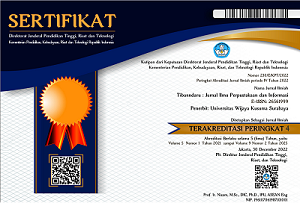Pentingnya Literasi Digital Pada Pendidikan Pekerjaan Sosial di Indonesia
Abstract
The Industrial Revolution 4.0 and Society 5.0 are marked by the massive use of the internet and artificial intelligence. As a result, some social work assistance processes have shifted to an online system. Such conditions demand social work education to equip students with digital skills. Research Purpose. This study tries to explain the importance of digital skills in social work education. Methods. This research method uses a literature study by reviewing various literature on digital literacy in social work education. Data Analysis. Data analysis was carried out by categorizing secondary data into themes. Social work education curricula must be responsive to the demands of digitalization in some social worker assistance practices. Result and Discussion. The use of ICT in social work education must refer to the standards formulated by professional organizations. Social work educators and students must be aware that digitizing social work practices is only a means of facilitating services, not an end. Conclusion. Digital literacy is a necessity in social work education. Therefore, it is necessary to prepare educators with digital skills and ethical standards for using ICT in social work education.
Keywords: Digital Literacy, Information and Communication Technology, Social Work Education
Full Text:
FulltextReferences
American Library Association. (2012). Digital literacy definition. Retrieved from http://connect.ala.org/node/181197
Baines, D., Cunningham, I., Kgaphola, I., & Mthembu, S. (2020). Nonprofit care work as social glue: Creating and sustaining social reproduction in the context of austerity/late neoliberalism. Affilia, 35(4), 449–465. https://doi.org/10.1177/0886109920906787
Bawden, D. (2001). Information and digital literacies: A review of concepts. Journal of Documentation, 57(2), 218–259.
Boddy, J., & Dominelli, L. (2016). Social media and social work: The challenges of a new ethical space. Australian Social Work, 70(1), 1–13. http://doi.org/10.1080/0312407X.2016.1224907
Bonk, C. J. (2009). The world is open: How web technology is revolutionizing education. San Francisco: Jossey-Bass.
Connor, P. (2017). Netiquette: Ground rules for online discussions. Retrieved from http://teaching.colostate.edu/tips/tip.cfm?tipid=128
Detlor, B., Hupfer, M., & Smith, D. H. (2018). Digital storytelling: An opportunity for libraries to engage and lead their communities. Canadian Journal of Library and Information Science, 42(1–2), 43–68.
Fisher, C.M. & Hitchcock, L.I. (2022). Enhancing Student Learning and Engagement Using Digital Stories. Journal of Teaching in Social Work. 42(4). 371-391. https://doi.org/10.1080/08841233.2022.2113492
Gillingham, P. (2019). Can predictive algorithms assist decisionmaking in social work with children and families? Child Abuse Review, 28(2), 114–126.
Glicken, M. (2008). A guide to writing for human service professionals. New York, NY: Rowman & Littlefield.
Hitchcock, L., & Battista, A. (2013). Social media for professional practice: Integrating Twitter with social work pedagogy. Journal of Baccalaureate Social Work, 18(Suppl. 1), 33–45.
Hitchcock, L., & Young, J. (2016, January). Tweet, tweet! Using live Twitter chats in social work education. Social Work Education, 35, 1–12. https://doi.org/10.1080/0 2615479.2015.1136273
Hitchcock, L. I., Sage, M., & Smyth, N. J. (Eds.). (2018). Technology in Social Work Education: Educators’ Perspectives on the NASW Technology Standards for Social Work Education and Supervision. Buffalo, NY: University at Buffalo School of Social Work, State University of New York.
JISC (2012) Digital literacy, [online], JISC InfoNet
Kennedy, S., & Yaldren, J. (2017). A look at digital literacy in health and social care. British Journal of Cardiac Nursing, 12(9), 428–432.
La Rose, T. (2019). Rediscovering social work leaders through You-Tube as archive: The CASW oral history project 1983/1984. Journal of Technology in Human Services, 37(2–3), 93–112.
Media Smarts. (2010). Digital literacy in Canada: From inclusion to transformation. https://mediasmarts.ca/sites/default/files/ pdfs/publication-report/full/digitalliteracypaper.pdf
National Association of Social Workers. (2011). Strengthening your writing skills: An essential task for every social worker. Retrieved from http://careers.socialworkers. org/documents/WritingSkillsLL.pdf
National Association of Social Workers. (2017). NASW, ASWB, CSWE, & CSWA Standards for technology in social work practice. https://www.socialworkers.org/LinkClick.aspx? fileticket¼lcTcdsHUcng%3D&portalid¼0
Parrott, L., & Madoc-Jones, I. (2008). Reclaiming information and communication technologies for empowering social work practice. Journal of Social Work, 8, 181– 197. https://doi.org/10.1177/1468017307084739
Rafferty, J., & Steyaert, J. (2009). Social work in the digital age. British Journal of Social Work, 39, 589–598. https://doi.org/10.1093/bjsw/bcp046
Suherdi, D. (2021). Literasi digital di masa pandemi. Deli Serdang: Cattleya Darmaya Fortuna.
Smyth, N. (2010). When is cultural incompetence okay? [Blog post]. Retrieved from https://njsmyth.wordpress.com/2010/09/10/when-is-cultural-incompetence-okay/
Sitter, K. C., & Curnew, A. H. (2016). The application of social media in social work community practice. Social Work Education, 35, 271–283. https://doi.org/10.1080 /02615479.2015.1131257
Svensson, P. G., Mahoney, T. Q., & Hambrick, M. E. (2015, December). Twitter as a communication tool for nonprofits: A study of sport-for-development organizations. Nonprofit and Voluntary Sector Quarterly, 44, 1086–1106. https:// doi.org/10.1177/0899764014553639
UNESCO (2018). A global framework of reference on digital literacy skilss for indicator 4.4.2. Available at http://www.uis.unesco.org
Wernet, S.P., Olliges, R., & Delicath, T.A. (2000). Postcourse Evaluations of WebCT (Web Course Tools) Classes by Social Work Students. Research on Social Work Practice, 10, 487 - 504.
Young, J. (2012, October 31). Participatory culture and Web 2.0: Bringing new media literacies to social work education [Blog post]. Retrieved from https://jimmysw. com/2012/10/31/participatory-culture-and-web-2-0-bringing-new-media-literacies-to-social-work-education/
DOI: http://dx.doi.org/10.30742/tb.v6i2.2562
Refbacks
- There are currently no refbacks.

This work is licensed under a Creative Commons Attribution-NonCommercial 4.0 International License.
Tibanndaru: Jurnal Ilmu Perpustakaan dan Informasi is indexing by:
Â
Reference Management Tools
 
![]()


.png)






